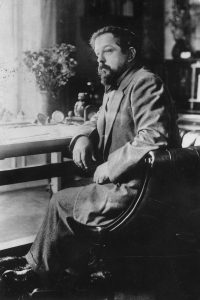Matthew Aucoin at the NYRB:

For modern listeners, Debussy practically defines French music, by which I mean that the essential qualities of his music—not only his sensuous delicacy but also his aversion to the harmonic behavior characteristic of late-nineteenth-century German music, a dense chromatic motion that tends to constantly, restlessly build to orgiastic climaxes, as in Wagner and Strauss—have come to be seen as also essentially “French” qualities. Walsh makes clear, however, that Debussy, far from simply amplifying or exemplifying the dominant tendencies of his musical milieu, consciously and stubbornly swam against the current, especially when it came to the heavy influence of German music on French composers. Wagner was the unavoidable presence in late-nineteenth-century Paris, but Debussy traced the blame for that influence further back, to Gluck. Debussy was quietly radical in his preference for Rameau’s “delicate and charming tenderness” over what he perceived as the Germanic “affectation of profundity or the need to double underline everything.”
more here.
